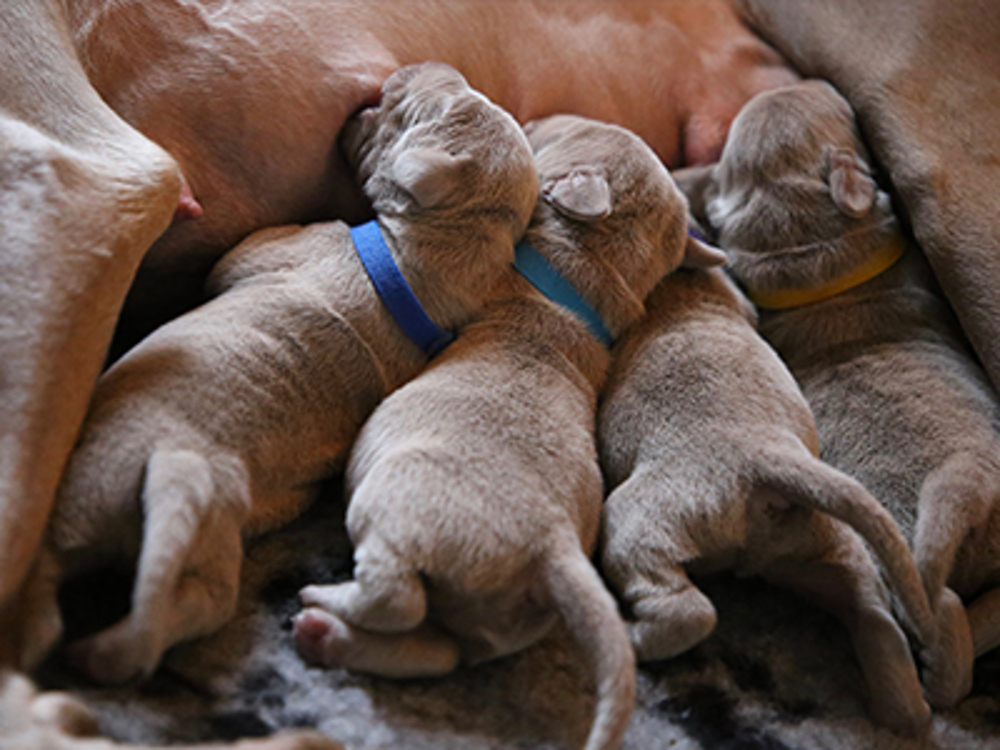At What Age Should I Feed My Litter of Pups Puppy Food
Feeding your puppy from birth to weaning

Weaning is an important part of your puppy's development. When your puppy weans, it means they move from relying on their mother's milk for all their nourishment to enjoying solid foods.
From birth
During the early stages of its life, a puppy will live with its mother and siblings. During this period they will not need to eat solid food, but will exist on their mother's milk. It is now that your puppy will begin to develop their senses, which in turn will help them seek nourishment. Initially your puppy will develop a sense of smell that will help them find their way to their mother's breasts, which they instinctively recognise as a source of nourishment.
During this early period, the mother cares for her puppies by keeping them warm with her body and by licking them. She does the latter not only to clean them, but also to help establish their basic physiological functions.
Puppies need food and heat, so when the mother temporarily moves away from them, they group together to make up for the loss of heat that her fur provides.
Human contact is also important during this early period as, in being handled and petted, the puppies will get used to there being a human presence.
Soon your puppies will be ready to begin weaning, which means moving them on to solid foods for the first time.
Puppies are born with very little natural immunity, and they will not develop this fully until around 16 weeks of age. Therefore, they rely solely on their mother to help provide some initial immunity defence through her milk.
Colostrum, a nutrient-rich milk, which mum produces for the first few days after birth, contains immunoglobulins that protect them from potential illness while their own immune system develops.
Sadly, this transfer of vital immunity from mum is sometimes poor, and so the pups may be at risk until their own immunity defence kicks in. This period in a puppy's development is known as the 'immunity gap'. During this time, puppies may be more vulnerable to infections.
When to wean puppies
The recommended time for weaning puppies is from around 3 weeks of age and can last until the pups are around 7-8 weeks.
What to feed puppies
You should feed a food that has been formulated specifically for puppies. The nutritional health of puppies, just like adult dogs, depends on receiving the correct amounts and proportions of five essential nutrients:
- water
- protein
- fat
- carbohydrates
- minerals
To be considered 'complete', a puppy food should contain all essential nutrients, except water, which should always be accessible. These nutrients must also be present in the proper proportion to ensure a puppy food is balanced.
Though fat, protein and calcium tend to get the greater emphasis in puppy foods, every single essential nutrient is key, especially during the period of rapid growth. Deficiencies in any essential nutrient can compromise short- or long-term health.
How to wean puppies
You should prepare their meals by mixing dry food with warm water and leave to soak for a few minutes until it has a porridge like texture – sometimes blitzing the kibble in a blender first can make it easier.
- Offer in small quantities at first and allow the pups to lap at the porridge
- Remove any uneaten food after approximately 10 minutes
- Give regular small meals
- Increase the amount as the pups grow, following the feeding guidelines on the food packaging
Initially, the puppies may be a little apprehensive, but after watching their mother, who leads by example, they will soon get used to the new flavours and textures.
Puppies can then gradually move away from eating moist food to eventually only being fed dry food. Once the puppies are a month old, it is important to leave water at their disposal at all times.
During the early stages of weaning puppies off of moist food, you will notice significant changes in them, which can happen from day to day. They grow up fast, and in no time at all they will begin to interact and play amongst themselves, improving their posture and movement.
Purina vets and nutritionists have developed PRO PLAN® Puppy with OPTISTART® & OPTIDIGEST®, which are scientifically proven to help support immune response in puppies by up to 50%**.
Based on colostrum, the bioactive molecules act on the GALT (the immune layer in the gut) to promote local immunity, helping to bridge the immunity gap.
Purina PRO PLAN® OPTISTART® food:
- contains high-quality pieces of chicken or lamb to help promote healthy muscle and skin
- is rich in omega fatty acids, EPA & DHA for optimum brain and vision development
- contains essential nutrients for growth in a highly digestible, complete formula
Purina PRO PLAN® OPTIDIGEST® food not only has colostrum to help support healthy immune function, but also contains a blend of natural prebiotic fibres scientifically proven to help the gut bacterial balance.***
PRO PLAN® OPTIDIGEST® foods also contain bentonite – a natural clay – which, in combination with the natural prebiotic, works together to help firm-up loose stools.
Article author
* Mila H, Grellet A, Chastant-Maillard S. Prognostic value of birth weight and early weight gain on neonatal and pediatric mortality: a longitudinal study on 870 puppies. In: Program and Abstracts, 7th ISCFR Symposium 2012;163-164.
** Satyaraj, E. et al.(2013): Supplementation of diets with bovine colostrum influences immune function in dogs. Brit J Nutr. 2013 Dec, 110(12): 2216-21.
*** Hernot, D. et al. (2008). Prebiotics and Synbiotics in Companion Animal Science. In: Versalovic, J., Wilson, M. (eds.). Therapeutic Microbiology:Probiotics and Other Strategies. ASM Press, Washington, DC. Pp. 357-370.
Source: https://www.thekennelclub.org.uk/health-and-dog-care/health/health-and-care/a-z-of-health-and-care-issues/feeding-your-puppy-from-birth-to-weaning/
0 Response to "At What Age Should I Feed My Litter of Pups Puppy Food"
Post a Comment